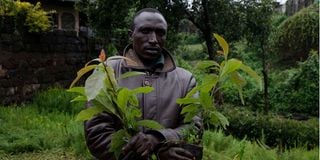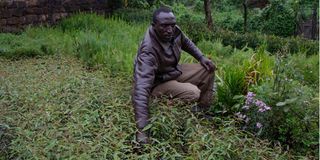Premium
How WhatsApp is helping group market tree seedlings

Daniel Ndung’u Munuhe tends to his tree seedlings in Elburgon, Nakuru County.
What you need to know:
- At his farm in Elburgon, Daniel Munuhe has more than 5,000 seedlings of different indigenous and exotic trees.
- Munuhe hopes the government will begin buying seedlings from Elburgon Tree Nurseries Self-Help Group.
Daniel Ndung’u Munuhe is one of the eight tree nursery owners and among the 15 farmers who created a WhatsApp group to market their seedlings.
Squatting as he weeds part of his quarter an acre, Munuhe says the reason for Elburgon Tree Nurseries Self-Help Group going digital was to reach as many clients as possible.
“We learnt that many Kenyans only look for seedlings during rainy seasons. Our group takes seedling production as a day-to-day business,” Munuhe says.
“The WhatsApp group enables us reach clients in all parts of Kenya.”
Munuhe has more than 5,000 seedlings of different indigenous and exotic trees. He started the business on a single bed of 2x20 metres in 2015.
The bed had about 750 tree seedlings that cost Sh5,000.
“I sourced certified seeds from the Kenya Forest Service (KFS) and local farmers,” Munuhe says, adding that he used around Sh10,000 in the entire process.
He ventured into tree seedling production after completing free training on seed collection by KFS. Later, Munuhe got permission to collect indigenous seeds from forests.

Daniel Ndung’u Munuhe tends to his tree seedlings in Elburgon, Nakuru County.
After eight months of weeding and watering, especially during dry times, Munuhe sold his first batch in 2016 at Sh5 per piece of exotic and Sh10 for indigenous seedling.
From the sales, Munuhe extended the portion to an acre. He later reduced it to a quarter an acre following a drought that the region.
Munuhe’s clients include farmers and NGOs. The farmer has more than 12 beds of different types of trees and a similar number for vegetables.
Because of the rising demand, especially because of the WhatsApp group, prices have shot up. An exotic tree seedling retails at Sh10 to Sh15 while indigenous one is Sh20 to Sh30.
He says demand is highest during the April to October long rains. He recently introduced fruit and flower seedlings on the farm.
Munuhe hopes the government will begin buying seedlings from Elburgon Tree Nurseries Self-Help Group and others in its campaign to plant 15 billion trees by 2032.
Through the short course on tree nursery management, group members now produce and sell certified seedlings.
“We urge the government to buy seedlings directly from us without involving middlemen,” Peter Kinyanjui, a member, says, adding that going digital has helped the group source cash and tanks from the devolved government of Nakuru.
Munuhe, Kinyanjui and others say they have gained more knowledge on tree production, especially on the use of farmyard and compost manure.
Kinyanjui has more than 300,000 seedlings on his one acre. He sources seeds from KFS Londiani centre.
His plan? To have a million tree and fruit seedlings on two acres should he get support from the government.
“A bed of 1x20m can have at least 20,000 seedlings. I have more than 20 types of tree and fruit seedlings on the farm,” Kinyanjui says.
There are months Elburgon Tree Nurseries Self-Help Group cannot sell their seedlings. It is one of its biggest challenges. Rodents also destroy the seedlings.
Nelson Gatheru, another group member, urges the government to send extension officers to tree seedling producers.
“Before devolution, extension officers used to train farmers on seed collection, the ecosystem and how it affected growers. They even gave us equipment. That is no longer the case,” he says.





